英语介词 at in on 的用法
介词at,in,on的用法

介词at,in,on的用法一、介词at的用法在英语中,介词at是一个常见且十分重要的介词。
它可以用来表达时间、地点和状态等概念。
下面将具体介绍at在不同情况下的用法。
1. 表示具体时间首先,at可用来表示一个确切的时间点。
例如,我们说“at 8 o'clock”表示在八点这个具体时刻;“at noon”表示在中午;“at midnight”表示在午夜等等。
2. 表示特定地点除了表示时间,at还可用于表达特定的地点。
比如,“at the park”意为在公园;“at the cinema”意为在电影院;“at home”意为在家等等。
3. 表示某种状态此外,at还可以表示某种状态。
例如,“be at ease”表示感到安心;“be at war”表示处于战争状态;“be at a loss”表示感到困惑等等。
二、介词in的用法接下来,我们来讲解介词in的用法。
in常被用来表达位置、时间范围以及某些状态。
1. 表示位置首先,in可表示一般位置或方位。
比如,“in the living room”意为在客厅里;“in the garden”意为在花园中;“in front of the house”意为在房子前面等等。
2. 表示时间范围另外,in还可用于表示时间范围。
例如,“in the morning”意为在早上;“in July”意为在七月份;“in the 20th century”意为在20世纪等等。
3. 表示状态除此之外,in还可表示某种状态。
比如,“result in”表示导致某种结果;“succeed in”表示成功;“engage in”表示从事某种活动等等。
三、介词on的用法最后,我们来探讨一下介词on的用法。
on主要用于表示具体日期、星期几、表面和运输工具等方面。
1. 表示日期和星期首先,on常用来表示具体的日期或星期几。
例如,“on January 1st”意为在一月一日;“on Monday”意为在星期一等等。
介词at,in与on的用法与区别
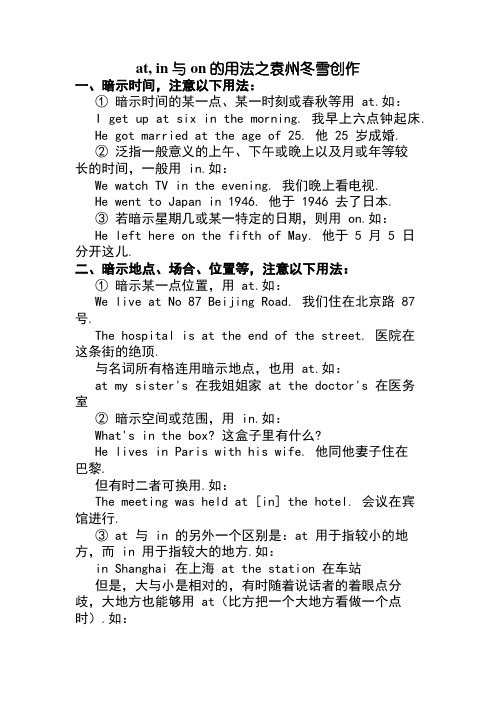
at, in与on的用法之袁州冬雪创作一、暗示时间,注意以下用法:①暗示时间的某一点、某一时刻或春秋等用 at.如:I get up at six in the morning. 我早上六点钟起床.He got married at the age of 25. 他 25 岁成婚.②泛指一般意义的上午、下午或晚上以及月或年等较长的时间,一般用 in.如:We watch TV in the evening. 我们晚上看电视.He went to Japan in 1946. 他于 1946 去了日本.③若暗示星期几或某一特定的日期,则用 on.如:He left here on the fifth of May. 他于 5 月 5 日分开这儿.二、暗示地点、场合、位置等,注意以下用法:①暗示某一点位置,用 at.如:We live at No 87 Beijing Road. 我们住在北京路 87 号.The hospital is at the end of the street. 医院在这条街的绝顶.与名词所有格连用暗示地点,也用 at.如:at my sister's 在我姐姐家 at the doctor's 在医务室②暗示空间或范围,用 in.如:What's in the box? 这盒子里有什么?He lives in Paris with his wife. 他同他妻子住在巴黎.但有时二者可换用.如:The meeting was held at [in] the hotel. 会议在宾馆进行.③ at 与 in 的另外一个区别是:at 用于指较小的地方,而 in 用于指较大的地方.如:in Shanghai 在上海 at the station 在车站但是,大与小是相对的,有时随着说话者的着眼点分歧,大地方也能够用 at(比方把一个大地方看做一个点时).如:Our plane refuelled at London. 我们的飞机在伦敦加油.We stopped for an hour at Moscow on our way to Paris. 我们在去巴黎的途中在莫斯科停了 1 个小时.④介词 on 用于地点,主要指在某物的概况.如:What's on the table? 桌上有什么?There's a wallet lying on the ground. 地上有个钱包.【注】在少数搭配中,也用介词 on.如:He works on a farm. 他在农场工作.三、在某些搭配中,三者的区别与英国英语和美国英语有关:in the street (英) / on the street (美) 在街上in the road (英) / on the road (美) 在路上in the team (英) / on the team (美) 在这个队at the weekend (英) / on the weekend (美) 在周末at weekends (英) / on weekends (美) 在周末四、有时三者的不同与搭配习惯和用法有关:in bed 在床上on the bed 在床上in the tree (多指树外之物) 在树上on the tree (多指树自己之物) 在树上at, in与on的区别一、in,on在方位名词前的区别1. in暗示A地在B地范围之内.如: Taiwan is in the southeast of China.2. on暗示A地与B地交界、毗邻.如: North Korea is on the east of China.二、at, in, on在暗示时间上的区别1. at指时间暗示:(1)时间的一点、时刻等.如:They came home at sunrise (at noon, at midnight, at ten o’clock, at daybreak, at dawn).(2)较短暂的一段时间.可指某个节日或被认为是一年中标记大事的日子.如:He went home at Christmas (at New Year, at the Spring Festival, at night).2. in指时间暗示:(1)在某个较长的时间(如世纪、朝代、年、月、季节以及泛指的上午、下午或傍晚等)内.如:in 2004, in March, in spring, in the morning, in the evening, etc(2)在一段时间之后.一般情况下,用于将来时,谓语动词为瞬间动词,意为“在……以后”.如:He will arrive in two hours.谓语动词为延续性动词时,in意为“在……以内”.如:These products will be produced in a month.注意:after用于将来时间也指一段时间之后,但其后的时间是“一点”,而不是“一段”.如:He will arrive after two o’clock.3. on指时间暗示:(1)详细的时日和一个特定的时间,如某日、某节日、星期几等.如:On Christmas Day(On May 4th), there will be a celebration.(2)在某个特定的早晨、下午或晚上.如:He arrived at 10 o’clock on the night of the 5th. (3)准时,按时.如:If the train should be on time, I should reach home before dark.三、at, in和on暗示地点时的区别1. at暗示地点:(1)用于指较小的地方.如: I shall wait for you at the station.(2)用于门商标码前.如: He lives at 115 Zhongshan Road.2. in暗示地点:(1)用于指较大的地方.如:He lives in Shanghai. (2)虽然是很小的地方,如果说话人住在那边,也可用in.商店、学校、机关等,若看做一个地点(point)用at,若看做一个场合(place)用in.如:I met him at the post-office.I’m now working in the post-office.3. on暗示地点,一般指与面或线接触,意为“在……上;在……旁”.如:The picture was hanging on the wall.New York is on the Hudson River.。
介词at和in,on的用法
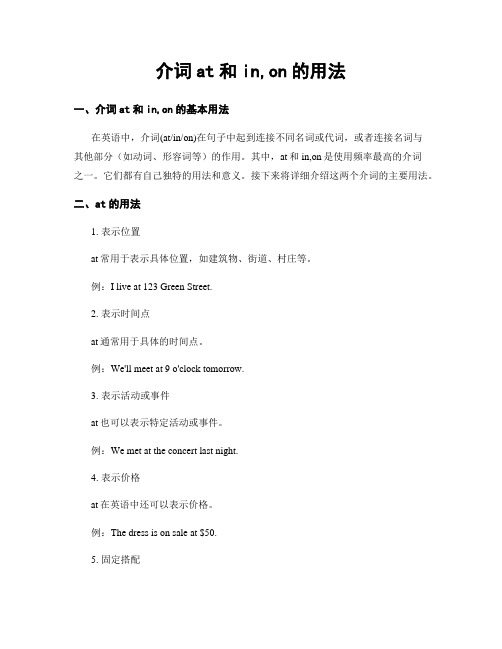
介词at和in,on的用法一、介词at和in,on的基本用法在英语中,介词(at/in/on)在句子中起到连接不同名词或代词,或者连接名词与其他部分(如动词、形容词等)的作用。
其中,at和in,on是使用频率最高的介词之一。
它们都有自己独特的用法和意义。
接下来将详细介绍这两个介词的主要用法。
二、at的用法1. 表示位置at常用于表示具体位置,如建筑物、街道、村庄等。
例:I live at 123 Green Street.2. 表示时间点at通常用于具体的时间点。
例:We'll meet at 9 o'clock tomorrow.3. 表示活动或事件at也可以表示特定活动或事件。
例:We met at the concert last night.4. 表示价格at在英语中还可以表示价格。
例:The dress is on sale at $50.5. 固定搭配at还与一些动宾结构固定搭配使用,如look at, laugh at等。
例:Don't laugh at others' mistakes.三、in的用法1. 表示位置范围in通常用于表示较大范围的位置,比如国家、城市等。
例:She lives in China.2. 表示月份/年份/季节等时间段in常用于具体的月份、年份、季节等时间段。
例:We'll go on vacation in July.3. 表示多久时间之内in也可以表示在一段时间内。
例:I can finish my work in two hours.4. 表示房间或建筑内部位置in还可以指室内的位置。
例:Please wait for me in the lobby.5. 与某些词固定搭配使用in和某些词组合使用时,有固定的搭配方式,如interested in, believe in等。
例:I'm interested in learning English.四、on的用法1. 表示接触面/表面位置on常用于描述平面接触面或表面位置。
介词on、in、at 的用法
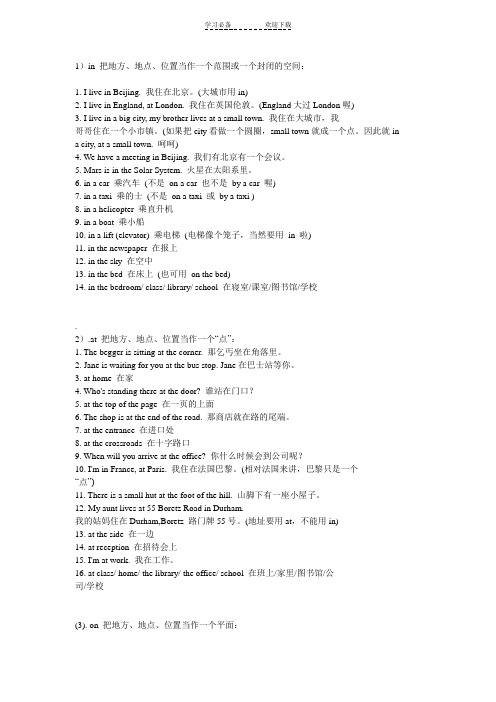
1)in 把地方、地点、位置当作一个范围或一个封闭的空间:1. I live in Beijing. 我住在北京。
(大城市用in)2. I live in England, at London. 我住在英国伦敦。
(England大过London喔)3. I live in a big city, my brother lives at a small town. 我住在大城市,我哥哥住在一个小市镇。
(如果把city看做一个圆圈,small town就成一个点。
因此就ina city, at a small town. 呵呵)4. We have a meeting in Beijing. 我们有北京有一个会议。
5. Mars is in the Solar System. 火星在太阳系里。
6. in a car 乘汽车(不是on a car 也不是by a car 喔)7. in a taxi 乘的士(不是on a taxi 或by a taxi )8. in a helicopter 乘直升机9. in a boat 乘小船10. in a lift (elevator) 乘电梯(电梯像个笼子,当然要用in 啦)11. in the newspaper 在报上12. in the sky 在空中13. in the bed 在床上(也可用on the bed)14. in the bedroom/ class/ library/ school 在寝室/课室/图书馆/学校.2).at 把地方、地点、位置当作一个“点”:1. The begger is sitting at the corner. 那乞丐坐在角落里。
2. Jane is waiting for you at the bus stop. Jane在巴士站等你。
3. at home 在家4. Who's standing there at the door? 谁站在门口?5. at the top of the page 在一页的上面6. The shop is at the end of the road. 那商店就在路的尾端。
at、on、in方位介词的用法
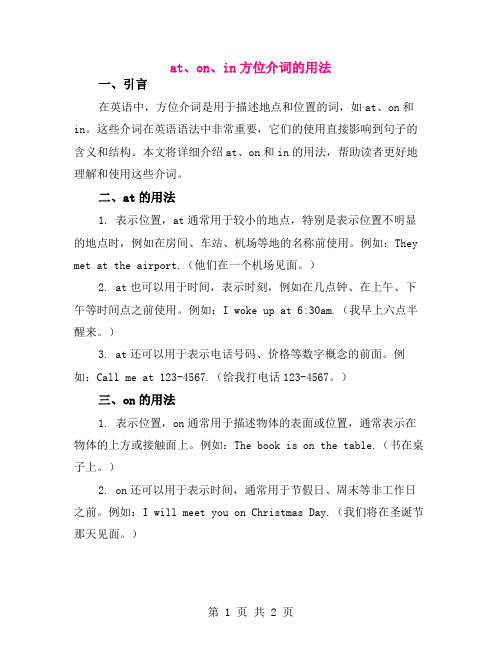
at、on、in方位介词的用法一、引言在英语中,方位介词是用于描述地点和位置的词,如at、on和in。
这些介词在英语语法中非常重要,它们的使用直接影响到句子的含义和结构。
本文将详细介绍at、on和in的用法,帮助读者更好地理解和使用这些介词。
二、at的用法1. 表示位置,at通常用于较小的地点,特别是表示位置不明显的地点时,例如在房间、车站、机场等地的名称前使用。
例如:They met at the airport.(他们在一个机场见面。
)2. at也可以用于时间,表示时刻,例如在几点钟、在上午、下午等时间点之前使用。
例如:I woke up at 6:30am.(我早上六点半醒来。
)3. at还可以用于表示电话号码、价格等数字概念的前面。
例如:Call me at 123-4567.(给我打电话123-4567。
)三、on的用法1. 表示位置,on通常用于描述物体的表面或位置,通常表示在物体的上方或接触面上。
例如:The book is on the table.(书在桌子上。
)2. on还可以用于表示时间,通常用于节假日、周末等非工作日之前。
例如:I will meet you on Christmas Day.(我们将在圣诞节那天见面。
)3. on还可以用于表示电视节目、广播节目等的播放时间。
例如:Please turn on the TV and watch the news at 7pm.(请打开电视在晚上七点观看新闻。
)四、in的用法1. 表示位置,in通常用于描述较大的地方或物体内部,例如房间、教室、学校、建筑物等场所的前面或里面。
例如:We meet in the classroom every day.(我们每天在教室见面。
)2. in还可以用于表示衣服或物体的尺寸或大小。
例如:She wears a dress in size 8.(她穿着8号的连衣裙。
)3. in也可以用于时间和年代的表述中,通常用于具体的日期或年份之前。
in,on,at介词短语用法

一、用in的场合(1)表示“在bai某年/月/季节”这个含义时du,须用介词in.例如:zhiin 1980.(2)表示“从现在起一段时间以后”时dao,须用介词in.例如:They will go to see you in a week. (3)表示“在某世纪”时,须用介词in.例如:This machine was invented in the eighteenth century. (4)表示“在某年代或特定世纪某年代”时,须用介词in.例如:This incident happened in the 1970''''s.除此之外,morning / evening / afternoon 三个词也常跟介词in连用.二、用on的场合(1)表示“在具体的某一天”或“(在具体的某一天的)早上、中午、晚上”等,须用介词on.例如:on May 10th,1982,on a rainy morning,on a summer afternoon.(2)表示“在星期几”或“在星期几的早上、中午、晚上”等,须用介词on.例如:on weekdays,on Saturday morning.(3)表示“在某一节日”时,须用介词on.例如:on Mid-autumn Festival,on Teachers''''Day. 注意:当morning,evening,afternoon被of短语修饰,习惯上用in,而不用on.例如:in the early morning of September 10th 在9月10的清晨;in the late afternoon of September 12th 在9月12日的傍晚.三、用at的场合(1)表示“某一具体时刻(即几点几分时)”,须用介词at.例如:at six(2)用在特定的时候(时节、时机)时,须用介词at.例如:They were happy at that time.他们那时很幸福.(3)表示“在中午、在夜晚、在周末”时,须用介词at.例如:What do you often do at noon?你中午经常做些什么?You can see many stars in the sky at night.夜晚你能看到天空中有许多星星.(4)表示“在……岁”时,须用介词at.例如:At the age of nine ,the boy could swim well.在九岁的时候,这孩子就游泳游得很好了.四、用by的场合by+时间名词.意为:“到…时(已发生某事),此时谓语多用完成时;最晚、不迟于…,在…之前”.如:by now/then/this time/next Friday/the end of/three o`clock等.By the end of last year,another new gymnasium had been completed.(2003上海·春)到去年年底,又有一座新体育馆峻工了.The train leaves at 6:00 pm.So I have to be at the station by 5:40 pm at the latest.(NMET97)火车下午六点开,所以最晚我得五点四十赶到车站.。
at、in、on在时间地点上的用法
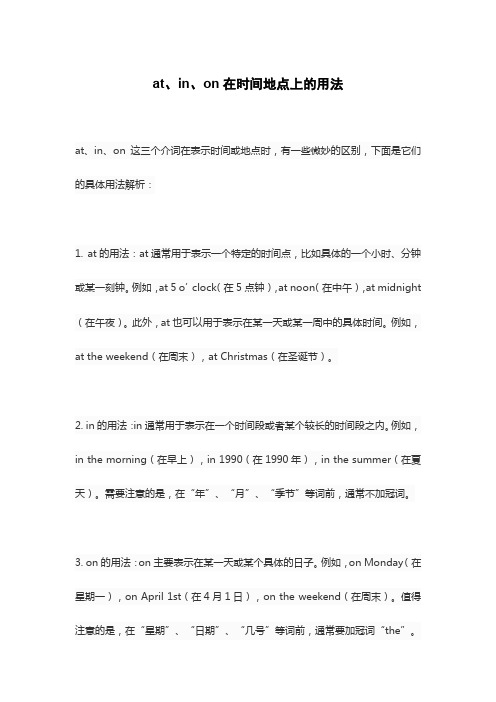
at、in、on在时间地点上的用法at、in、on这三个介词在表示时间或地点时,有一些微妙的区别,下面是它们的具体用法解析:1. at的用法:at通常用于表示一个特定的时间点,比如具体的一个小时、分钟或某一刻钟。
例如,at 5 o’clock(在5点钟),at noon(在中午),at midnight (在午夜)。
此外,at也可以用于表示在某一天或某一周中的具体时间。
例如,at the weekend(在周末),at Christmas(在圣诞节)。
2. in的用法:in通常用于表示在一个时间段或者某个较长的时间段之内。
例如,in the morning(在早上),in 1990(在1990年),in the summer(在夏天)。
需要注意的是,在“年”、“月”、“季节”等词前,通常不加冠词。
3. on的用法:on主要表示在某一天或某个具体的日子。
例如,on Monday(在星期一),on April 1st(在4月1日),on the weekend(在周末)。
值得注意的是,在“星期”、“日期”、“几号”等词前,通常要加冠词“the”。
关于地点方面,这三个介词的区别主要如下:1. at表示在某一点,或者在小的、具体的范围内。
例如,at the bus stop(在公交车站),at the crossroads(在十字路口)。
2. in表示在一个较大的、封闭的空间或者范围之内。
例如,in the classroom (在教室里),in the office building(在办公楼里)。
3. on表示在某个物体的表面或者上方。
例如,on the table(在桌子上),on the floor(在地上)。
以上是at、in、on三个介词的基本用法解析,它们的具体用法可能会因语境的不同而有所变化。
在使用时,要根据具体的语境选择合适的介词。
in,on,at的用法
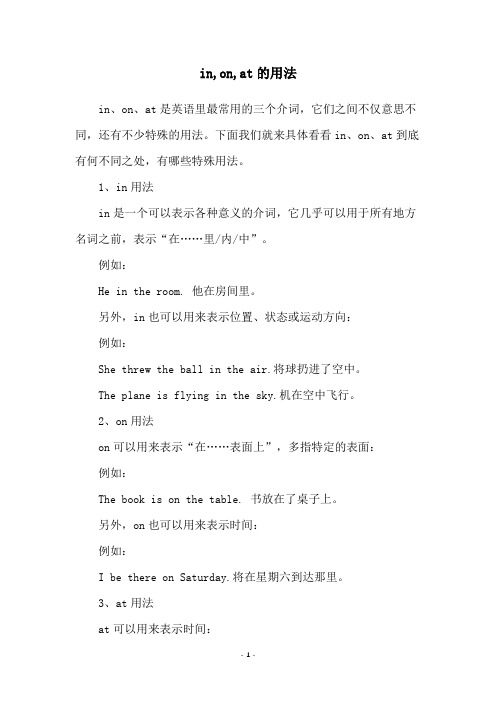
in,on,at的用法
in、on、at是英语里最常用的三个介词,它们之间不仅意思不同,还有不少特殊的用法。
下面我们就来具体看看in、on、at到底有何不同之处,有哪些特殊用法。
1、in用法
in是一个可以表示各种意义的介词,它几乎可以用于所有地方名词之前,表示“在……里/内/中”。
例如:
He in the room. 他在房间里。
另外,in也可以用来表示位置、状态或运动方向:
例如:
She threw the ball in the air.将球扔进了空中。
The plane is flying in the sky.机在空中飞行。
2、on用法
on可以用来表示“在……表面上”,多指特定的表面:例如:
The book is on the table. 书放在了桌子上。
另外,on也可以用来表示时间:
例如:
I be there on Saturday.将在星期六到达那里。
3、at用法
at可以用来表示时间:
例如:
We must leave at six oclock.们必须六点钟离开。
另外,at还可以表示“在……的某个部分/点”:
例如:
He was standing at the door. 他站在门口。
总结
以上是in、on、at三个介词的用法介绍,虽然它们的意思很接近,但在某些情况下,这三个介词还是有所区别的,因此需要我们在使用时要特别注意,以免出现错误。
- 1、下载文档前请自行甄别文档内容的完整性,平台不提供额外的编辑、内容补充、找答案等附加服务。
- 2、"仅部分预览"的文档,不可在线预览部分如存在完整性等问题,可反馈申请退款(可完整预览的文档不适用该条件!)。
- 3、如文档侵犯您的权益,请联系客服反馈,我们会尽快为您处理(人工客服工作时间:9:00-18:30)。
Write at/ on/ in if necessary. Sometime there is no proposition.
1. I’m leaving ……….Friday. 2. I’m leaving ……………next Friday. 3. I always feel tired …………..the evening. 4. Will you be at home ………this evening? 5. We went to France ………….last summer. 6. Laura was born…………..1975. 7. What are you doing ……………the weekend? 8. I phone Robert…………..every Sunday. 9. Shall we play tennis………….. next Sunday? 10.I’m going out. I’ll be back………..an hour. 11.I don’t often go out …….. Night. 12.I can’t go to the party………..Sunday.
Are you going away ………… the weekend? I can’t sleep ……… night. Where will you be……… Christmas? I’m going on holiday ………. the end of October. Are you busy ……… the moment.
Today is 14 June. My exam is on 28 June. …………………………………………………………………………
It’s 3 o’clock now. Tom will be here at 3:30. ………………………………………………………………………...
Are you going out ………...this evening? The garden was lovely ………………last summer. I’m going on holiday …………. next Monday.
At the weekend At night At Christmas / at Easter At the end of …. At the moment
Write at/ on/ in
1. Goodbye! See you………. Friday. 2. Where were you ……….28 February. 3. I got up ……… 8 o’clock this morning. 4. I like getting up early ………. the morning. 5. My sister got married ………….. May. 6. Helen and I first met …….. 1979. 7. Did you go out ………… Tuesday? 8. Let’s meet …………7:30 tomorrow evening. 9. I often go away ………… the weekend. 10. I’m starting my new job …………..3 July.
We do not use at/ on/ in before: This… (this morning/ this week etc.) Last… (last August/ last week etc.) Next… (next Monday/ next week etc.) Every… (every day/ every week etc.)
1. We often go to the beach …………summer. 2. George isn’t here ……….. the moment. 3. Julia’s birthday is ………… January. 4. Do you work…………….. Saturday? 5. Did you go out …………… Tuesday evening? 6. The company started ……………. 1969. 7. I like to look at the stars ……….night. 8. Will you go to the party …………. Monday evening? 9. I’ll send you the money………. the end of the month. 10.Do you often go out ………… the evening?
1. …………...6 June 2. ……….the evening 3. ………. half past two 4. ……… Wednesday 5. …….. 1987 6……….. September 7. ………24 September 8 ………. Thursday 9 ……… 11:45 10………Christmas Day
at on in
I start work …….. 8 o ‘clock. The shops close……….. 5:30.
8 o'clock
at
10:30
midnight
Goodbye! See you ……… Friday. I don’t work ………. Sundays. The concert is ……….22 November.
It leaves five minutes from now.
= Hurry! The train leaves ………… five minutes.
I’ll see a few days from now.
= Goodbye! I’ll see you ……… few days.
1:20 now
I always feel good …….. The morning. Do you often go out ………….the evening?
I’m meeting Jill ……….. Monday morning. Are you doing anything …………… Saturday evening?
11 ………the morning 12……….. Friday morning 13……….. Saturday night 14……….. night 15 ……….the end of the day 16 ………. the weekend 17 ……….winter 18……….. Christmas
1:30 In ten minutes
Write sentences with in…
It’s 5:25 now. The train leaves at 5:30. …………………………………………………………………………
It’s Monday today. I’ll phone you on Thursday. …………………………………………………………………………
Monday
Thursday
--------------- driving lesson 4 o'clock
Tuesday meet Sam 2:30 Wednesday
Friday phone Chris Saturday
cinema (evening) party (evening)
Lisa is going to the cinema on Wednesday evening. She has to phone Chris…………………………………… She isn’t doing anything special ………………………… She’s getting a driving lesson……………………………….. She’s going to a party………………………………………….. She’s meeting Sam…………………………………………ew Year's Day
I’m going on holiday ……….. October. Emma left school ………. 1993. The garden is lovely ……… Spring.
in
June 1987 summer
Write at/ on/ in.
•In the morning/ in the afternoon/ in the evening •On Monday morning/ on Tuesday afternoon/ on Friday evening/ on Saturday night etc.
Write at/ on/ in
